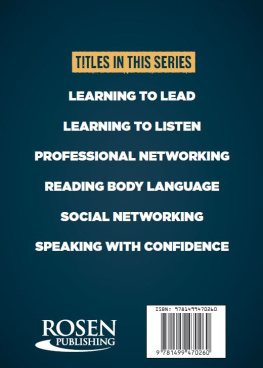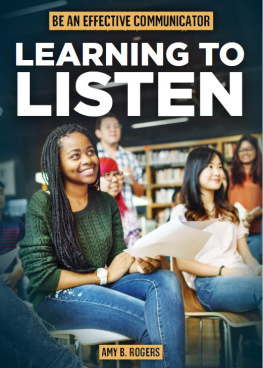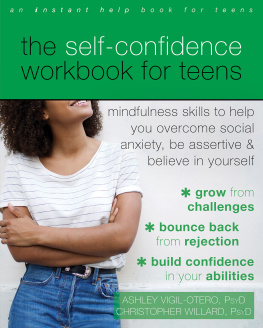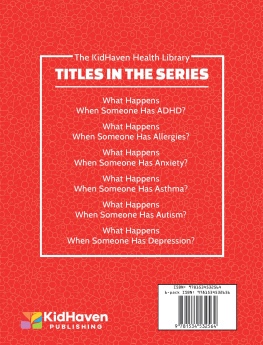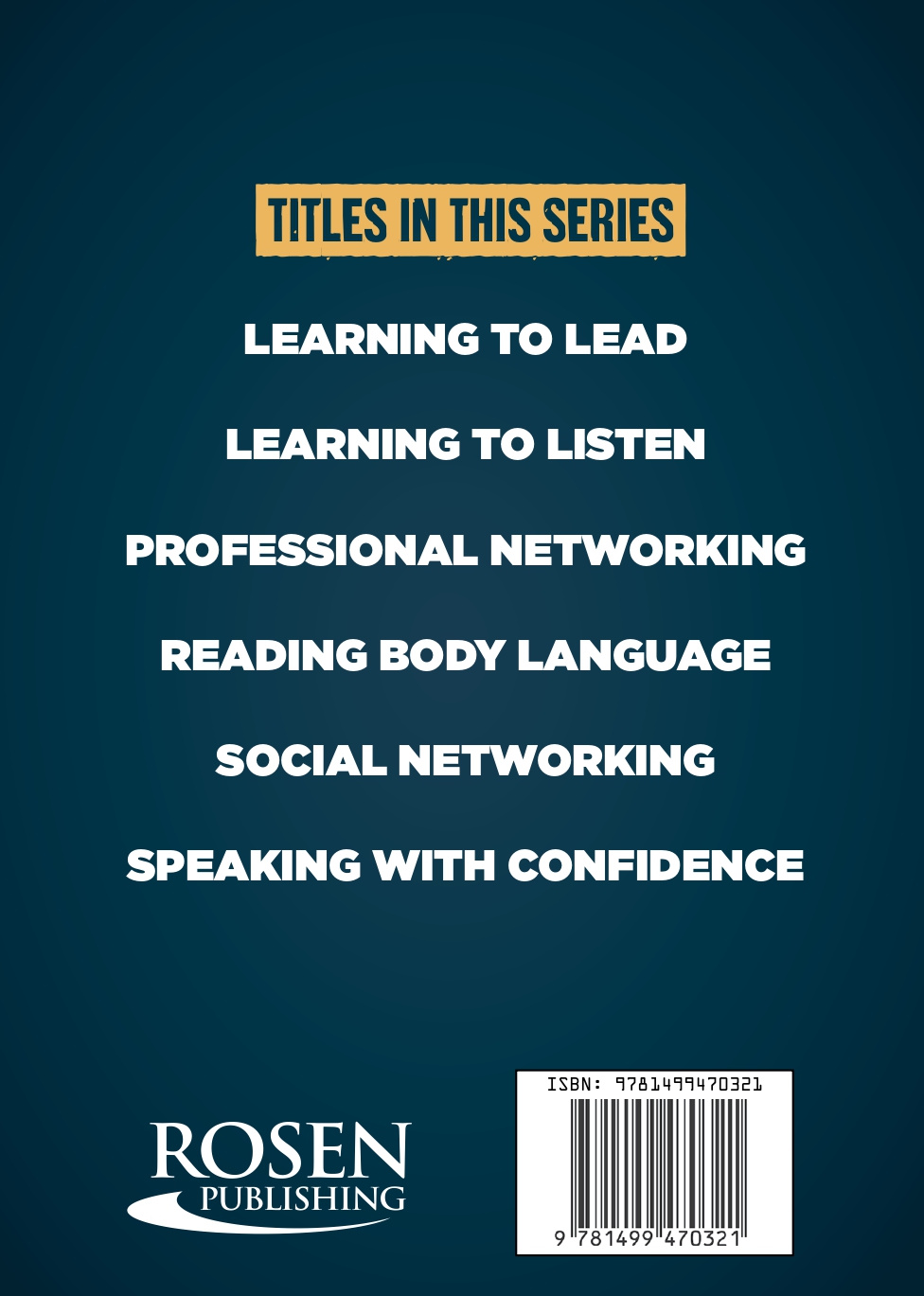CHAPTER 1
CONNECTINGWITHCLASSMATES
Y ou spend a lot of your time at school. That makes it a great place to practice your speaking skills. In the classroom, the cafeteria, and the halls, youre likely to meet and interact with many different kinds of people. Some of them will become your closest friends, some will be people you work with on group projects or as lab partners, and some might even be people you dont get along with at all. Its important to know how to communicate with all of these different types of classmates. You have to spend a lot of time with them, so its good to learn how to work together to meet goals, make friends, and deal with bullying behavior.

Not everyone you meet at school is going to become your best friend but its still important to speak to them with respect and empathy, while respecting yourself too.
Its important to approach most interactionsespecially with your peersfrom a place of empathy. This means trying to understand another person before judging them. Even if you dont know a classmate well or if your group project partner seems like they have a perfect life, its never helpful to make assumptions about someone you need to communicate with. Instead, speaking to them in an open, friendly, and clear wayand listening actively when they speak to youcan help you both get to know each other better and find common ground.
Confident speakers often use their words to connect with others, and they generally work to make sure these connections are positive ones. Theyre not bullies. In fact, confident speakers know how to use their communication skills to deal with bullying behavior and make spaces like school safer and better for everyone around them.
PUBLIC SPEAKING AT SCHOOL
When you think of speaking with confidence in the classroom, one of the first things that might come to mind is giving a speech or presentation. You might be asked to deliver a book report in front of your class, to give a presentation about a person in history, or to deliver a speech before student council elections. Some schools even have public speaking classes that students can take as an elective or must take as part of the curriculum.
For some people, even just the idea of speaking in front of their class or their whole school makes them feel anxious, and thats perfectly normal. It can be scary to speak in front of a crowd. However, if you have to give a presentation or speech, its helpful to be prepared and to practice. Being as prepared as possible by learning as much as you can about what youre going to be talking about, writing out notes or even your whole speech, and taking care of your body (by eating, drinking water, and getting enough sleep before your speech) can help you feel more confident. In addition, delivering your speech in front of a mirror, practicing in front of friends or family, or videotaping yourself can help you take note of any stumbling blocks, work on your use of gestures, and make sure youre not speaking too loud, soft, fast, or slow.
When you get up to deliver your speech, its helpful to make eye contact with people in the audience, stand up tall, and remember to breathe. Reminding yourself that you know what youre talking about and that your classmates want to see you succeed can give you the confidence boost you need to get a good grade on your presentation or win the class election on the strength of your speech. Public speaking may seem scary, but it can also be rewarding!
WORKING TOGETHER
Another time its important to speak with confidence at school is when youre working on a group project or an assignment with a partner. This can be a stressful situation, especially if youre paired with a group or an individual youre not friends with or dont know very well. However, its helpful to remember that youre all working together toward the same goalto complete the assignment and to get a good grade.
Public speaking is an important life skill, and its good to practice it at school.

The Basics of Body Language
The words we use when we speak are only one of the ways we communicate our thoughts and feelings to those around us. Another important form of communication is nonverbal communication, which is also known as body language. Nonverbal communication involves the facial expressions we make, the gestures we use, the way we stand, and even our tone of voice. In some cases, these enhance the message were sending with our words. In other cases, they reveal our true feelings when our words are saying something else.
For example, if youre running for class president, you might give a speech in which you say youre happy to be addressing your classmates. However, if youre looking down with your shoulders hunched while nervously drumming your fingers on the podium, you wont look happy. Youll look nervous and unsure. Body language is such a big part of communication that people often take the messages it sends as the truth over someones words whenever those two things contradict each other.
Paying attention to your body language is a big part of speaking with confidence. If you notice that you play with your hair when youre nervous, you can take that awareness and change that habit to appear more confident. You can hold your hands at your sides instead of playing with your hair. This makes you look less anxious.
Speaking in front of a mirror or asking a trustworthy friend to point out any nervous gestures can help you realize the little things you do without even thinking about them that might cause you to appear less confident in conversation. Then, you can work to change those habits and replace them with ones that make you look and feel more sure of yourself.
One of the most important parts of a group or partner project is clearly communicating the roles each person needs to fulfill. If you feel your strengths would make you a good fit for a certain part of the project, share that with the person or people youre working with. For example, if part of the project involves making a video and you enjoy making short movies on your computer, you can let your group members know that youd like to take charge of that part of the assignment.
As the roles are being assigned, make sure theyre being assigned evenly so no one ends up with too much work. If you feel youve been given an unfair workload or a task youre not comfortable with, speak up right away. This can keep you from falling behind or resenting your group members later. In addition, once youre given your task, verify it with your other group members to make sure you know exactly what your job is and when you need to have it done, and if one of your group members asks you about their responsibilities, clearly outline their role and any dates they need to remember for deadlines.
Sometimes, even if the workload is divided fairly at the beginning, someone falls behind on their part or doesnt contribute as you thought they would. When approaching a classmate who has fallen behind on their part of a project, dont belittle them. They may be confused or overwhelmed and too embarrassed to approach you or ask for help. Instead, approach them from a place of empathy and ask if they need help or have any questions about their part of the assignment. If they are simply looking for someone else to take over their work, though, its important to firmly remind them what they need to do and what date they need to have it done by. Stick to the facts and the plan you established when the assignment was given, and dont raise your voice or let your anger keep you from clearly communicating what needs to be done. If you have to bring the teacher into the discussion, which can sometimes happen, stay calm and focused on the project at hand and not your clashing personalities.


